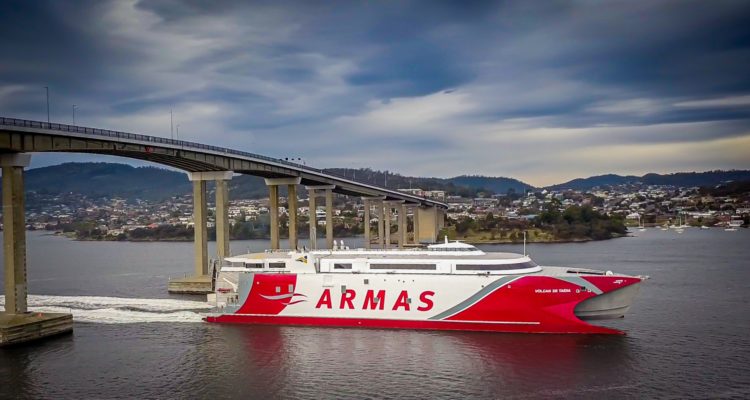When Incat Tasmania, a builder of high-speed ships for commercial ferry operators and militaries, was experiencing problems with their supplier of structural fire protection (SFP) panels, the company reached out to AYRES Composite Panels to develop and qualify a new SFP system for marine applications. AYRES took on the redesign of the panels for insulating the structure of aluminum ships with an eye toward helping the ship builder save weight and reduce costs.
“Most recently, Incat had been using a fiber mat pressed into boards with a hard ceramic facing. The board was relatively heavy, and the facing was easily damaged during installation and in service,” says Christoph Becker, Group CEO of AYRES Composite Panels, a global manufacturer of lightweight honeycomb panels for marine interiors headquartered in Bayswater, Western Australia.
AYRES named its new panels FReD, which derives from the International Maritime Organization’s Fire-Resisting Divisions in its safety codes for High-Speed Crafts. FReD panels are flat honeycomb panels with intumescent mineral fiber mat applied to one side. The heat of a fire causes the mat to expand into a stable thick blanket, insulating the support panel and ship structure.
AYRES collaborated with Technical Fibre Products (TFP), a supplier of the intumescent fiber mat, to develop the FReD panels. “TFP had been supplying a mat for similar applications in the past, which is why we were very interested to work with them,” says Becker. “However, current fire rules are more stringent than any mats TFP had qualified for to date, so TFP had to develop a new solution.”
The two companies began discussions in May 2019 with a goal of meeting a tight time frame of July 2020 to develop, test and qualify the panels before installing them in an Incat vessel. But it wasn’t all smooth sailing.
TFP visited AYRES’ Mobile, Ala., production facility to learn about the company’s production processes while AYRES’ engineers traveled to the TFP facility in Burneside, U.K., to witness the mat production and learn about the required physical and performance parameters of the mats. TFP manufactured a run of mats and AYRES built the FReD panels, but the initial results failed insulation and protection tests.
By directly observing how the failures occurred, AYRES was able to modify the construction to improve results. In January 2020, AYRES and TFP held in-depth discussions about the tests and ways to improve the results. By the end of February, a new design successfully met the International Maritime Organization’s stringent insulation and fire suppression test requirements.
“It would not have been possible to meet insulation requirements in the required timeframe without TFP’s technical and manufacturing expertise,” says Becker. “We were under a lot of pressure to have our ducks in a row to be selected for a specific Incat vessel build. While initial failure always hurts, perseverance pays off.”
The redesigned FRP panel features a 12mm thick aluminum honeycomb, treated against saltwater corrosion, as a core material. “While one might think that aluminum is not ideal for thermal insulation, a non-metallic honeycomb would have been too expensive. We rely on the mineral fiber mat to provide the required insulation that protects the panel,” says Becker.
The intumescent mats are manufactured from high temperature-resistant mineral fibers, which are then integrated into the composite structure to impart integrated resistance to burn through and flame spread and to provide insulation from the heat of combustion.


